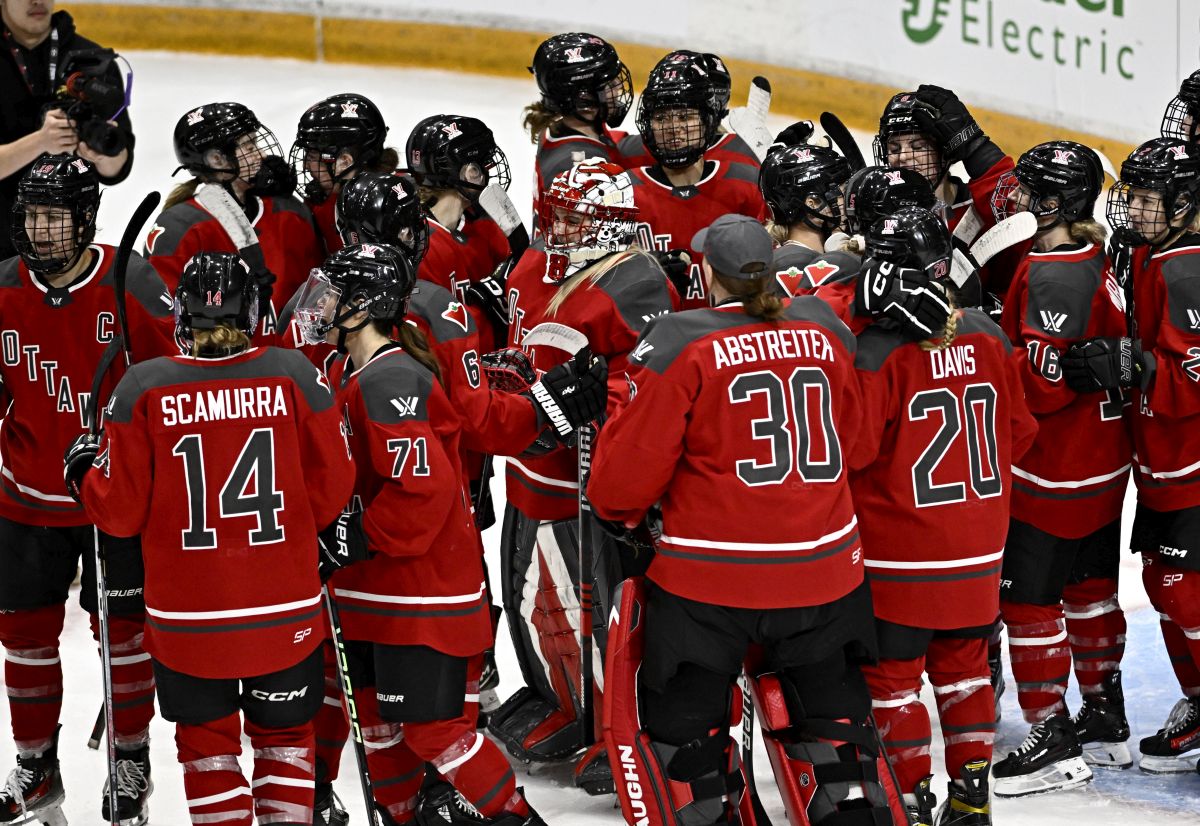Emerance Maschmeyer grew up on a farm near Bruderheim, Alta., with a love for playing hockey and a dream of playing in the NHL.

“I think all females, that’s what we all said: ‘I want to play in the NHL too.’ We didn’t think anything of it but of course that was not a realistic goal for us,” she told Global News in a recent interview.
“Playing professionally in a women’s pro league wasn’t even a thought because there wasn’t anything like it.”
But now, Maschmeyer is the backstop for Ottawa’s team in the Professional Women’s Hockey League, which is already being celebrated as a massive success in its inaugural season.
“It’s been such a blast,” the 29-year-old said with a smile that stretched from ear to ear.
“Every day I have to kind of wake up and say, ‘Is this really happening? This is finally coming true?’ And it has come true.”
Maschmeyer has played in 18 games for Ottawa so far this season, more than any other goaltender in the PWHL. Her team currently occupies fourth place in the standings, which would mean the club would have a spot in the playoffs if the post-season began today.
“I think we’re becoming more and more consistent in our play and I think that our d-zone is so great — everyone’s helping me out so much in our zone,” Maschmeyer explained. “Our team is evolving and growing each game, and I think that we’re creating some great momentum here for the last bit of the season.”
This season, the Olympic gold medallist boasts a 2.33 goals-against average with Ottawa, along with a .911 save percentage. Her seven wins have her tied for second among PWHL goaltenders this season. And last week, she earned her first-ever shutout in the new women’s hockey league as her team defeated New York by a score of 3-0.
“It felt really nice to get that big goose egg,” Maschmeyer said. “This league’s very competitive, so getting a shutout, it’s a tough achievement to get.”

While playing in the PWHL is not Maschmeyer’s first foray into professional hockey, she describes her time in the new league as something beyond what she has experienced before, and likens the excitement to what she has seen while playing for Canada at the international level.
“Yes, I’ve played professional, but nothing like this,” she said. “We have the resources, we have the salaries, we’re travelling like pros, we’re being treated like pros. The personnel behind us, there’s so many qualified individuals.

Get daily National news
“Going into the season, there was so much buzz around our league and so much excitement … but I didn’t realize how big our fan base was and how big it’s become.”
Maschmeyer acknowledged the success other PWHL teams have had already in terms of fan attendance at games, but spoke at length about what she has seen in the nation’s capital where she plies her trade.
“In Ottawa, primarily all our games are sold out, which is unreal, especially when it’s a Wednesday game after work,” she said.
“To see the support consistently, not just our first game or home opener, it’s been throughout the entire season which is so awesome.”
Maschmeyer told Global News about when she was a young girl and decided to aim for playing for Team Canada and playing at the Olympics once she realized an NHL career was highly unlikely. She said the “route” for her to achieve her goals was to play hockey in boys leagues.
“I grew up playing hockey in Fort Saskatchewan, kind of all the way through until midget. Until my last year (when) I went and played for the Lloydminster Bobcats in the AJHL,” she recalled.
“That was my last year of playing boys (hockey) before I went to college. I went to Harvard University for four years.”
Before leaving Harvard, Maschmeyer was recognized as a top-10 finalist for the Patty Kazmaier Award as a sophomore. When she left, she was also the program’s all-time leader in saves.
From there she ended up donning jerseys for Team Canada and Team Alberta and playing in the Canadian Women’s Hockey League which ceased operations in 2019. In that league, Maschmeyer was named the 2018-19 Goaltender of the Year.
She also played in the Professional Women’s Hockey Players Association which was founded after the CWHL came to an end.
“(The PWHPA) was trying to form this league and get kind of the backing and investment behind it,” Maschmeyer explained. “Playing professionally in a women’s pro league wasn’t even a thought because there wasn’t anything like it. So it only kind of became a dream of mine more recently, probably within the last four or five years when our league folded and was like, ‘We really need a professional league. Like, it’s time.’
“Here I am. Dream come true.”

















Comments
Want to discuss? Please read our Commenting Policy first.